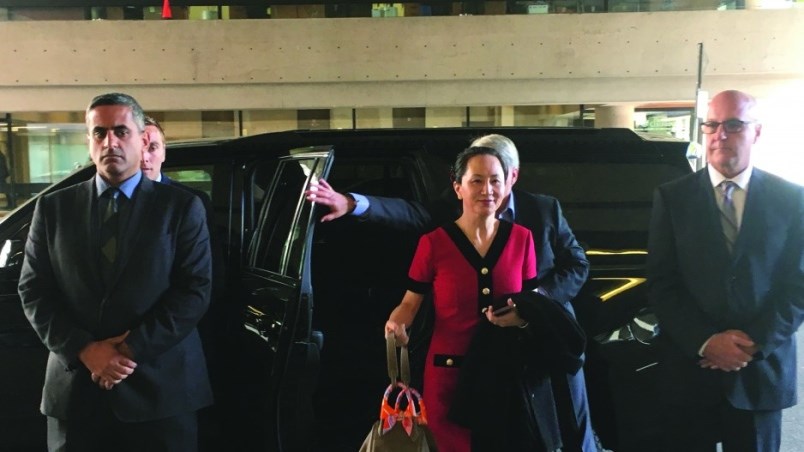Day 1 of the double criminality debate in the Meng Wanzhou extradition hearing saw defence lawyers for the Huawei executive levying heavy attacks on the U.S. sanctions against Iran and the sanctions' status in Canada.
Defence lawyer Richard Peck echoed Meng's document filings last week that the core issue of Meng's arrest and extradition request is Huawei's violation of U.S. sanctions on Iran — sanctions that Canada does not follow.
Peck said the Crown's argument that the core crime is fraud — by funneling proceeds from Iran through HSBC in the United States, thereby endangering HSBC to be punished by U.S. law for unknowingly violating the sanctions — is a misdirection.
"The question here is, would we be here today without the sanction law?" Peck said in court. "My contention is no... This has every appearance of the requesting state [the United States] enlisting Canada to enforce its sanctions - sanctions that Canada has clearly repudiated."
Peck also noted Canadian court has a history of "defending Canadian sovereignty" in matters such as foreign policy, which includes upholding Ottawa's stance on U.S. sanctions on Iran.
Double criminality — or the extradition requirement that the accused crime of the target individual is an arrestable offence in Canada as well as the requesting state (the U.S. in this case) — is expected to be the centre of debate this week. Crown prosecutors, representing the extradition request from the U.S. Department of Justice, said while Meng and Huawei have allegedly violated American sanctions against Iran by having a subsidiary company operate there, the "essence" of the offence is fraud against financial institutions based in the U.S. like HSBC.
The Crown says that Meng and Huawei misrepresented the origins of the Iran market proceeds, leading the HSBC processing the funds — which they would not have done so had they known the money's Iranian origins.
Peck and Meng's lawyers, however, cited a number of documents in the court records on this case from the United States that spoke specifically about authorities' concerns centring around Huawei's violation of sanctions, not the tech giant's misrepresentation towards HSBC. Lawyers added that Canadian fraud has an element of "risk of deprivation" — the possibility of the victim party of fraud suffering a tangible or economic loss — that is not in U.S. legal definitions of fraud.
Meng's lawyers contended in court Monday that all the U.S. language in the court documents used Huawei's failure to disclose its source of funds — thus putting HSBC in danger of violating U.S. sanctions and suffering potential fines and punishments — as the proof of "risk of deprivation" that fits the Canadian context of fraud. The defence argues that it means even the fraud charges are based on U.S. sanctions, so if the sanctions do not apply in a Canadian legal context, the criteria of double criminality of the fraud charge also isn't met.
"The hypothetical risk is all based on the sanctions," Peck said. "... It is expressively false that the U.S. has an interest in possible fraud against a bank. But it is in the U.S.'s every interest to enforce the Iran sanctions. The argument is that HSBC could suffer because of the sanctions, but in a Canadian setting, HSBC is not at risk because the system does not punish innocent victims." On Monday afternoon, Meng lawyer Eric Gottardi led the defence argument further on the Crown using U.S. sanctions as the basis of “deprivation” requirement in Canadian legal definition of fraud. Gottardi characterized the consequences of deprivation faced by HSBC in handing Huawei’s proceeds from Iran inherently tied to the sanctions; without them, the risk “evaporates,” he said.
However, Gottardi had difficulty answering question from judge Heather Holmes — the judge’s first major line of questioning for the day — that, if the case is domestic and not an extradition (and all relevant facts transposed), would a fraud case be viable based on what allegedly happened.
“You can arguably make out a case,” Gottardi concluded, but added he may defer to other defence team members to answer. Holmes then followed with questions on why the question of fraud needed to consider U.S. factors and not stick to Canadian criteria in an extradition case if a domestic case can already be established.
The hearing continues this afternoon.
Click here for original story.



